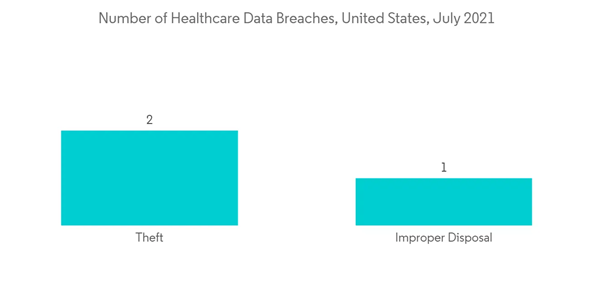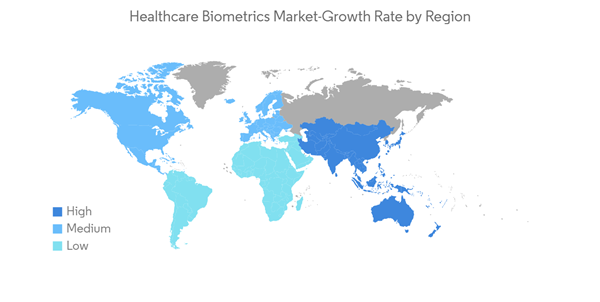The main challenge for the healthcare system in many countries was to limit the spread of COVID-19 among people and provide the best care to infected patients and decrease the number of possible deaths. A profound impact on the healthcare biometrics market was observed as well. According to the article published in 'Biometric Technology Today' in April 2020, the COVID-19 circumstance necessitates the implementation of contactless and efficient operations, particularly in retail. Contactless technologies such as face and iris-based detection systems are being pushed to new heights, while applications that rely on fingerprint recognition modalities suffer a substantial loss due to the COVID-19 pandemic's increasing criteria. Furthermore, Covid-19 will also have a significant and long-term impact on biometrics companies, developers, investors, and customers. For instance, as per the study published in April 2020, titled 'Impact on Biometrics of Covid-19', the most immediate impact of Covid-19 is that contactless technologies like face and iris recognition are now being forced to adapt to the emergent threat. Biometric AI and ML algorithms are being pushed to new heights to extend governments' protective, monitoring, and screening reach. According to recent government regulations, organizations must avoid utilizing palm print, fingerprint, and hand-key scanners to prevent physical contact and virus spread. These steps are paving the way for user-friendly iris scans and facial recognition technology that may be used in a variety of settings.
Healthcare biometrics refers to different biometric applications used in hospitals and clinics to monitor patients' health. Different initiatives are taken by the government in the field of healthcare biometrics due to the rise in healthcare fraud and to increase security for protecting healthcare information driving the market for healthcare biometrics. For instance, in August 2022, The French parliament (Assemblée Nationale) voted for a new EUR 20 million (roughly USD 20.4 million) project 242-95 to establish a biometric version of citizens' health cards (Carte Vitale).
Furthermore, emerging applications across novel fields of clinical research of medical devices are expected to open new avenues in the biometric healthcare market. Also, the increase in government initiatives toward healthcare infrastructure in developing countries drives the global healthcare biometric market.
Additionally, the key activity by the market players, such as expansion and product launch, is anticipated to drive market growth. For instance, in November 2021, ZKTeco reported the opening of a new factory in Bangalore, India, claiming that this would pave the way for new possibilities and business opportunities. Which aims to develop a modern and efficient infrastructure base to open up new opportunities for local production and workforce procurement, as well as create a conducive eco-system for the Biometric and Security Industry.
However, factors such as consumer acceptance and the high cost of healthcare biometric devices impede market growth.
Healthcare Biometrics Market Trends
Multifactor-factor Authentication is Expected to Cover a Large Share of the Market Over the Forecast Period
Adding more authentication factors expands the security of any access management solution into multi-factor authentication (MFA). MFA offers scalable, tiered levels of security that can be deployed for controlling access to the most sensitive of data. Medical information, databases, and other valuable information should all deploy various levels of MFA, incorporating several factors, which can include passwords, secret questions, OTPs, location, user behavior, registered mobile devices, etc., other than biometrics.According to the study titled "Advances in Feature Transformation based Medical Decision Support Systems for Health Informatics," published in the Hindwi Journal in March 2022, most biometrics authentication in healthcare is used for patient tracking and monitoring, although usage for access control, identification, workforce management, and patient record storage is also increasing. Hence all these factors, coupled with the safety of MFA over traditional methods, are expected to help the growth of the market.
However, technological advancements in the MFA system, such as touchless and face detection. The touchless MFA increased the safety and convenience of the clinician. For Instance, in June 2020, Caregility's telehealth platform has single sign-on (SSO) and multi-factor authentication (MFA) capabilities. End users can log into the platform with a single set of credentials and gain access to the various apps, websites, and data for which they have permissions, thanks to SSO enhancements. By reducing password fatigue, the feature improves security and system usability, as well as employee satisfaction.
Thus all aforementioned factors are expected to boost the segment growth over the forecast period.
North America is Expected to Dominate the Healthcare Biometrics Market During the Study Period
The North American region is expected to increase due to the high number of frauds and crimes occurring in the healthcare sector. The presence of a high incidence of fraudulent activities is expected to increase the rate of adoption of these technologically advanced biometric systems to gather patient data and registration data. Furthermore, the establishment of new healthcare facilities such as hospitals and clinics may act as a primary driving force for the growth of this market in the region.Furthermore, several companies are starting various strategies like collaboration, new product launches, mergers, and acquisitions to maintain and increase their market share. For instance, in June 2021, Clear signed up for Atlantic Health as a partner for the digital ID provider's Health Pass, which features face biometrics for credential-binding and data security, to provide the health care network's patients with a digital proof of COVID-19 vaccination.
Moreover, various strategic activities adopted by the key market players, such as mergers and acquisitions, product launches, and partnerships, anticipated market growth. For instance, in February 2022, rf IDEAS partnered with ID R&D to bring its market-leading biometric authentication and anti-spoofing products to the rf IDEAS portfolio.
Additionally, in May 2021, Imprivata launched face biometrics for healthcare through the Aware and Idemia partnership. The new mobile face biometrics solution is intended to enable simplified self-enrollment for electronic prescriptions for controlled substances (EPCS) in compliance with the United States Drug Enforcement Agency (DEA) regulations.
Thus, owing to the above-mentioned factors, it is expected to aid the growth of the market studied in the North American region over the forecast period.
Healthcare Biometrics Industry Overview
The majority of the healthcare biometrics are being manufactured by the global key players. Joint ventures and collaborations amongst the players can be expected in the forecast period. These systems, combined with rising awareness levels and seamless integration solution systems across different verticals, are a few key strategies that are expected to be implemented by the players. Some of the market players are Thales Group, Bio-Key International Inc., Fujitsu Limited, Imprivata Inc., and NEC Corporation.Additional Benefits:
- The market estimate (ME) sheet in Excel format
- 3 months of analyst support
This product will be delivered within 2 business days.
Table of Contents
Companies Mentioned (Partial List)
A selection of companies mentioned in this report includes, but is not limited to:
- Zkteco, Inc
- Thales Group
- Bio-Key International Inc
- Crossmatch Technologies Inc
- Fujitsu Limited
- Imprivata Inc
- Lumidigm
- Morpho
- NEC Corporation
- Suprema Inc
- Integrated Biometrics
- Facetec Inc.










